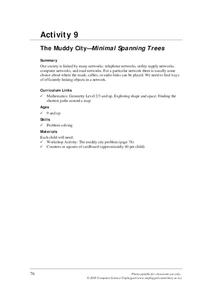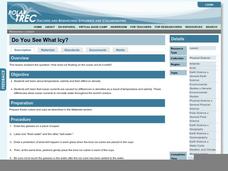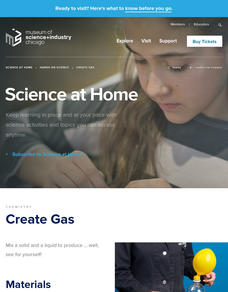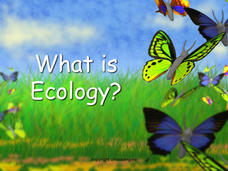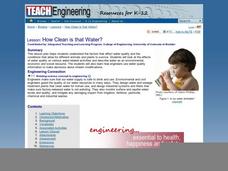San Francisco Public Utilities Commission
What is Drought? No Rain, No Water
How can climate change affect our water supply? Have kids read a passage about the water cycle and water conservation, which includes six questions that challenge them to use context clues.
Cornell University
Nano What?
The size of a nanoparticle is difficult for pupils to grasp. A hands-on experiment is designed to give your classes perspective. Learners analyze different sports drinks for the content of electrolytes as an introduction to nanoscale....
Curated OER
Science: Let's Investigate!
This presentation on the scientific method uses simple terms for young learners. It will elicit a lot of discussion in your class as they figure out what the people in the slides are trying to discover. Very nice!
Illinois Department of Natural Resources
Section One: What is Biodiversity?
Four intriguing and scientific activities invite learners to explore the natural resources of their town. The activities cover concepts such as genetic traits, organizing species in a taxonomy, the differences between different species...
Computer Science Unplugged
The Muddy City—Minimal Spanning Trees
What is the most efficient way to ensure everyone is connected? Individual pupils determine the least expensive route to pave roads in a fictional city. In doing so, they learn to find the minimal spanning tree for the situation. They...
NOAA
Climate, Weather…What’s the Difference?: Make an Electronic Temperature Sensor
What's the best way to record temperature over a long period of time? Scholars learn about collection of weather and temperature data by building thermistors in the fourth installment of the 10-part Discover Your Changing World series....
American Museum of Natural History
What do You Know About Marine Biology
Show me what you know about the sea. Learners answer 10 questions about marine biology. The questions range from what evidence points to the origin of life to the biggest threat to oceans.
American Museum of Natural History
What do you know about Biodiversity?
What do your classes know about biodiversity? A 10-question online quiz asks questions related to biodiversity and species groups. As learners answer questions, they click on links to additional information. The lesson could be an option...
American Museum of Natural History
What Do You Know About Astronomy
Develop an understanding of the universe. Learners answer 10 multiple choice questions about several topics in astronomy. Questions contain information about the age of the universe, gravitational attraction, galaxies, planets and comets...
Polar Trec
Do You See What Icy?
Here is a lesson that kicks off with a question. "How does ice floating on the ocean act as it melts?" As learners investigate this natural phenomenon, they'll discover that it has a lot to do with temperature, salinity, and the effect...
Royal Society of Chemistry
Green Plastics—Chemistry Outreach
How do green plastics reduce waste and environmental pollution? Budding scientists create and test a variety of compounds used in green plastics during an insightful experiment. Beginning with startling statistics and ending with...
Curated OER
Taxonomy - The Science of Naming Organisms
Carolus Linnaeus designed the binomial nomenclature system of naming organisms that is still in use more than 200 years later. By viewing this PowerPoint, upcoming biologists learn how to use it. They are also introduced to the hierarchy...
Museum of Science
Create Gas
Let's have a gas. Individuals mix baking soda and vinegar in a bottle. Learners view the interaction between the solid and the liquid and notice that a gas is formed. Scholars notice the gas inflates a balloon stretched across the mouth...
Biology Junction
What Is Ecology?
Do you know the name for the biological study of interactions? A short presentation with accompanying worksheet introduces individuals to ecology. The materials offer a broad overview of the subject and the levels of organization to...
Environmental Protection Agency (EPA)
Excuse Me, Is This the Way to the Drainpipe?
Elementary kids read and color the story of Willy Wetsworth, a drop of water, as he describes the journey that he and his friends take to provide fresh water to houses. He tells his story to Martha Merriweather, a little girl, and...
Beyond Benign
What's In a Window?
Take a peek inside a window to heat efficiency. Scholars watch a demonstration to investigate how heat dissipates from several different cups of hot water. Scholars then relate the exchange to how heat escapes from the windows of a...
Curated OER
What Is Special About Polyethylene Food Storage Bags?
Students participate in an investigation in which they compare a polyethylene bag designed for recycling or disposal with a polyethylene food storage bag. Students use hexane to determine the differences between the low density...
Groundwater Foundation
How Wet Is Our Planet?
Here's a powerful demonstration that makes the point that it is everyone's responsibility to conserve water and protect the earth's limited supply of fresh water.
Curated OER
What is Soil?
Learners examine soil. In this earth science activity, students define and describe weathering and erosion as it relates to soil. Learners compare and contrast potting soil with forest soil and complete a science observation worksheet.
Curated OER
What is an Earthworm Like?
Second graders study earthworms. In this science lesson plan, 2nd graders observe an earthworm using a magnifying lens, draw pictures of the earthworm, and record their observations.
Curated OER
What is Work?
In this science worksheet, students describe the work in 3 situations as positive, negative, or no work. Students also answer questions about power.
Curated OER
What Is a Watershed?
Students explore the concept of water pollution. In this environmental stewardship lesson, students discover what watersheds are and consider how to protect them.
Curated OER
Science Fair With An Energy Efficiency Flair
In order to learn more about energy conservation, pupils work to promote energy efficiency by participating in a school-wide science fair with an emphasis on energy conservation. In addition to displaying their projects, learners invite...
Curated OER
How Clean is the Water?
Learners read about and discuss water and how it is used as a resource and how engineers use technology to preserve it. In this water lesson plan, students look at a picture of water treatment and tell what is wrong with the picture.
Other popular searches
- What Is Science Important
- What Is Science Worksheets
- Science What Is Science
- What Is Science Fiction
- What Is Science Worhsheets
- What Is a Science Theory
- What Is Science Skills?
- What Is Science Florida
- Science What Is a Rock?




